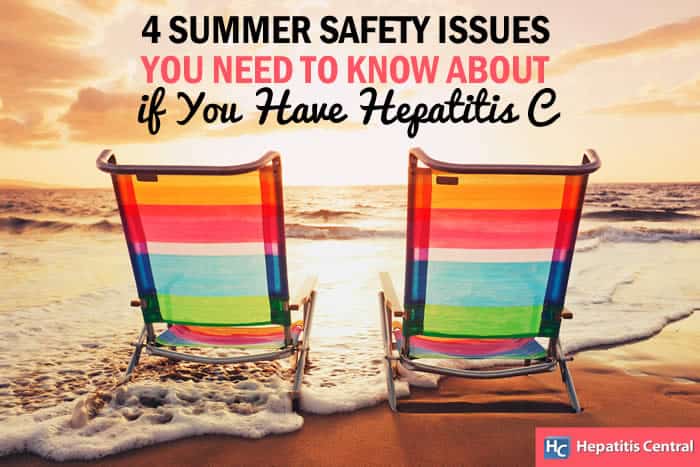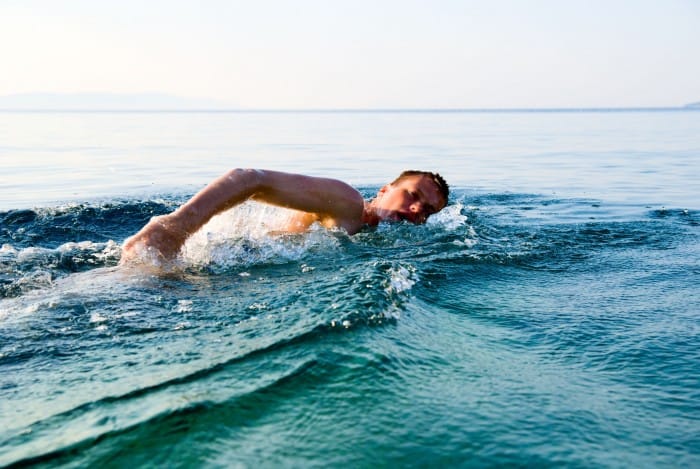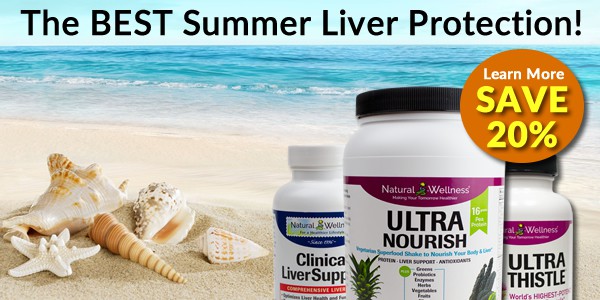4 Summer Safety Issues You Need to Know About if You Have Hepatitis C


A liver battling Hepatitis C is more vulnerable than a liver unburdened by disease. Hepatitis C is a virus that launches a continual assault on liver cells, causing inflammation and cellular damage. Your liver has many roles, one of which is to filter toxins out of your bloodstream. Someone with Hepatitis C is likely to have a liver with some damaged areas, which can cause a backlog of toxins. In addition, a liver with some damaged areas (fibrosis or cirrhosis) will have reduced blood flow throughout the organ. Both of these impediments mean that those with Hepatitis C need to be more vigilant about how their activities and environment impact their health.
Although not exclusive, those with Hepatitis C are urged to be aware of these four common summer issues that could pose safety issues.
1. Swimming Pools
Nothing beats cooling off by jumping in a pool during the summer. However, repeated exposure to pool water could jeopardize liver safety. Untreated pool water is a potential breeding ground for bacteria, viruses, protozoa and fungi, all of which can cause greater damage to someone with Hepatitis C. On the other hand, a pool treated with chemicals (chlorine or bromine) greatly reduces bacteria, viruses, protozoa and fungi, but exposes the swimmer to chemicals, which presents toxicity to the liver.
Experts advise avoiding untreated pool water, and believe that pool chemicals are okay as long as it is not excessive. If a pool has recently been shocked, or if the chemicals burn to breathe in, do not soak in it. In addition, if someone with Hepatitis C intends on spending every hot summer day in a pool, consider looking for an ultra-violet (UV) disinfected pool, which doesn’t create any toxic byproducts.
2. Photosensitivity
Whether prescription or over-the-counter, many medications can increase a person’s sensitivity to sunlight. Also known as photosensitivity, this common medication side effect causes people to burn easily and quickly, get hives or a rash, or develop other skin eruptions. Many drugs that someone with Hepatitis C might take list photosensitivity as a side effect, including some antihistamines, non-steroidal anti-inflammatories, antibiotics (tetracyclines and sulfa drugs), antidepressants, antipsychotics, cardiovascular medications, oral diabetes drugs, diuretics, and St. John’s Wort.
More specifically, two medications frequently used in Hepatitis C therapy are known to cause photosensitivity: ribavirin and Olysio (simprevir). For those especially sensitive, a photosensitive reaction may also be triggered by indirect sun exposure, such as light reflected off pavement.
The following 5 tips can help protect against photosensitivity:
- Avoid sun exposure during the heat of the day (10am – 4pm).
- Use a broad-spectrum sunscreen with an SPF of at least 15, preferably 30 – which protects against both UVA and UVB rays.
- Use at least one full ounce of sunscreen 30 minutes prior to sun exposure and reapply after swimming or excessive sweating.
- Wear protective clothing such as wide-brimmed hats, sunglasses and sun-protective clothing such as tightly-woven, long-sleeved shirts and pants, or clothes with a high SPF rating.
- Consider adding a Hair, Skin & Nails supplement to your summer routine. Natural Wellness’s Hair, Skin & Nails supplement contains powerful antioxidant vitamins C and E, and the mineral selenium, all of which help protect your skin against harmful UV light damage and other sources of oxidative or free radical damage.
3. Salt Water Swimming
Playing in the ocean, sea or Gulf is a favorite summertime activity, but those with Hepatitis C need to be aware of the danger it could pose to them. At any given point there can be chemicals, bacteria, and other pollutants in seawater. Some beach areas regularly test the water for sewage and bacteria – and are fastidious about alerting swimmers of water pollution; others are less thorough.
One pathogen that is particularly harmful to those with Hepatitis C and is frequently found in saltwater in the summer months is Vibrio Vulnificus. Requiring salt to survive, V. Vulnificus is a bacterial microorganism that belongs to the same family as cholera. If V. Vulnificus finds its way into the bloodstream of someone with advanced Hepatitis C, the consequences can be dire. Assuming your saltwater swim does not include drinking the water, pollutants in the ocean can be harmful if you have an open wound.
Although a bleeding cut or scrape is an obvious break in the skin, there are others that could put someone with Hepatitis C at risk, such as:
- A new tattoo or piercing that isn’t fully healed
- A scratched, open bug bite
- A paper cut or hangnail
- Any broken skin – common with eczema or dry hands
Individuals with Hepatitis C who intend on swimming in the ocean (or sea or Gulf) should be aware of this risk. If a break in the skin is noticed, experts advise cleaning it with fresh water right away and avoiding subsequent saltwater swimming.
4. Overheating
Our summers seem to be getting hotter and hotter, putting more people at risk of developing heat illness. While the body normally cools itself by sweating, during very hot weather (especially if it is humid), sweating may not be enough. If your body temperature rises too high, you can develop a heat illness.
There are three stages of heat illness:
- heat cramps
- heat exhaustion
- heat stroke
Heat cramps are brief, painful muscle cramps in the legs, arms, or abdomen that may occur during or after vigorous exercise in extreme heat.
A more severe heat illness is heat exhaustion, which may include symptoms of increased thirst, weakness, fainting, muscle cramps, nausea, headache, irritability and clammy skin. If left untreated, heat exhaustion can lead to heat stroke, a dangerous – potentially fatal condition.
Although heat stroke is always a medical emergency, those with Hepatitis C are in an especially perilous position. According to Anthony Michaels, MD, an assistant clinical professor of medicine and gastroenterology at the Ohio State Wexner Medical Center in Columbus, “Heat stroke causes liver damage, or liver shock, because it decreases blood supply to your liver.” Although having Hepatitis C does not increase your risk of getting heat stroke, it could make heat stroke (already a medical emergency) more dangerous.
If overheating is suspected, experts advise moving to a cool, air-conditioned area, removing excess clothing, drinking cool fluids with electrolytes, and cooling your body with a wet cloth or cold water. If unable to drink or cool down, IV fluids and a trip to the emergency room are called for.
Summer days are longer and hotter than the rest of the year, and are usually associated with going on vacation, relaxing, and having fun. However, those with Hepatitis C should be aware of the hazards associated with the increase in heat. Armed with knowledge, Hepatitis C sufferers can protect themselves from any chemicals or pathogens in swimming pools and seawater, and shield themselves from photosensitivity and heat illness.
https://hepatitisc.net/living/weather-impact-hcv/, How Does the Weather Impact HCV?, Jenelle Marie Pierce, Retrieved July 15, 2018, Health Union LLC, 2018,
https://hepc.liverfoundation.org/treatment/the-basics-about-hepatitis-c-treatment/hcv-medications-precautionary-measures/, HCV Medications: Precautionary Measures, Retrieved July 15, 2018, American Liver Foundation, 2018.
https://kidshealth.org/en/parents/heat.html, Heat Illness, Retrieved July 15, 2018, The Nemours Foundation, 2018.
https://www.everydayhealth.com/news/how-avoid-heat-stroke-when-you-have-hepatitis-c/, How to Avoid Heat Stroke When You Have Hepatitis C, Chris Iliades, MD, Retrieved July 15, 2018, Ziff Davis, LLC, 2018.
https://www.hepatitiscentral.com/news/pool_chemicals/, Pool Chemicals and Hepatitis C, Nicole Cutler, L.Ac., Retrieved July 15, 2018, Hepatitis Central, 2018.
https://www.hepatitiscentral.com/news/do_sunlight_and/, So Sunlight and Hepatitis C Meds Mix?, Nicole Cutler, L.Ac., Retrieved July 15, 2018, Hepatitis Central, 2018.
https://www.liversupport.com/liver-health-summer-safety-bulletin-saltwater-swimming/, Liver Health Summer Safety Bulletin: Saltwater Swimming, Retrieved July 15, 2018, liversupport.com, 2018.










